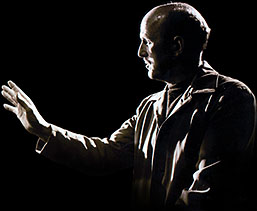 Like most of the greats in contemporary cinema history, Michael Powell is
difficult to sum up, for he defies any easy categorisation.
Take Frank Capra, mix in a little Hitchcock and season with a pinch of
Fritz Lang and you are somewhere close to appreciating the full flavour
of Powell's cinema. For every measure of mystical romance and fantasy
found in one of his films, there is an equal helping of darkness and
sadistic despair in another. The light frills and spills of the
supernatural romance,
A Matter Of Life And Death couldn't be further away from the
disturbing psychosis of the controversial classic,
Peeping Tom.
And, yet the one thing that every Michael Powell film has in common,
regardless of subject matter, is a fantastic and often elaborate eye for
mise en scene. He excelled at visual trickery and the composition of
sound and pictures, to create an extra level of communication in film
that went far beyond mere words alone. Powell set the precedent for this
type of filmmaking and in doing so, has today, alongside Alfred Hitchcock,
become one of the most influential and revered figures in film history.
Like most of the greats in contemporary cinema history, Michael Powell is
difficult to sum up, for he defies any easy categorisation.
Take Frank Capra, mix in a little Hitchcock and season with a pinch of
Fritz Lang and you are somewhere close to appreciating the full flavour
of Powell's cinema. For every measure of mystical romance and fantasy
found in one of his films, there is an equal helping of darkness and
sadistic despair in another. The light frills and spills of the
supernatural romance,
A Matter Of Life And Death couldn't be further away from the
disturbing psychosis of the controversial classic,
Peeping Tom.
And, yet the one thing that every Michael Powell film has in common,
regardless of subject matter, is a fantastic and often elaborate eye for
mise en scene. He excelled at visual trickery and the composition of
sound and pictures, to create an extra level of communication in film
that went far beyond mere words alone. Powell set the precedent for this
type of filmmaking and in doing so, has today, alongside Alfred Hitchcock,
become one of the most influential and revered figures in film history.
Powell began his career as an apprentice to director Rex Ingram with whom he worked on a number of films throughout the 1920s. It was here that Powell learned the nuts and bolts of his trade. He served as a grip on The Magician (1926), an actor in The Garden Of Allah (1927) and a camera assistant on Mare Nostrum (1925). He later went on to work with Hitchcock; as stills photographer on Champagne (1928) and then more famously as an uncredited scriptwriter on the first sound film, Hitchcock's Blackmail.(1929). It was this experience that gave Powell the proficiency and self-assurance that would serve him so well as a director.
Powell's first substantial film was The Edge Of The World, which led to a contract offer from the revered producer, Alexander Korda. Far more importantly however, this also led to Powell's introduction to a man with whom he was to have a long and fertile collaboration - Emeric Pressburger.
Powell and Pressburger, under their trademark Archers production logo, wrote, produced, and directed a long succession of landmark British films, including The Life & Death Of Colonel Blimp, I Know Where I'm Going, A Matter Of Life & Death, Black Narcissus and of course The Red Shoes. In all of these brilliant collaborations, Powell and Pressburger embraced a vivid and beautiful style of filmmaking that was received with confusion by the conservative British film industry. Powell used an inner eye to see beyond the normal vale of appearance, whilst Pressburger created an imaginative fantasy in his writing that melted through the dimensions. Mysticism and a spiritual religion were always central to their films; qualities that have given most of these titles a timeless value.
Powell & Pressburger's creative partnership came to an end in the mid 1950s, when Pressburger's focus on realism and Powell's interest in fantasy became more and more at odds with one another. Powell went on to direct Peeping Tom, the film that many believe was chiefly responsible for ending his career. Although today, it has been re-assessed as a complex classic; upon its release the film was showered with critical loathing, Powell was branded a pornographer and shamed into exile. One review famously said of Peeping Tom, that "the only worthwhile thing to do with this film, would be to flush it down the sewer." Ironically twenty years later, Powell would be the director in residence at Hollywood's biggest independent film studio and a eminent advisor to American film giants such as Martin Scorsese, Francis Ford Coppola and Steven Spielberg.
When asked if he considered himself a storyteller, Powell remarked that he saw himself as more of a conjurer, a magical decorator of fantasies. You need only watch one Michael Powell film to understand what he meant by this. Mere factual narrative was never enough for Powell, for his mind was too far embedded in the fantastical. Romance, mysticism, other worlds, spirituality, the inner eye; all of these things were what drove Powell. He was a dreamer who used cinema to bring life to his dreams.
Our featured interview. The following transcription is a compilation of several interviews done for the BBC throughout the 1980s.
